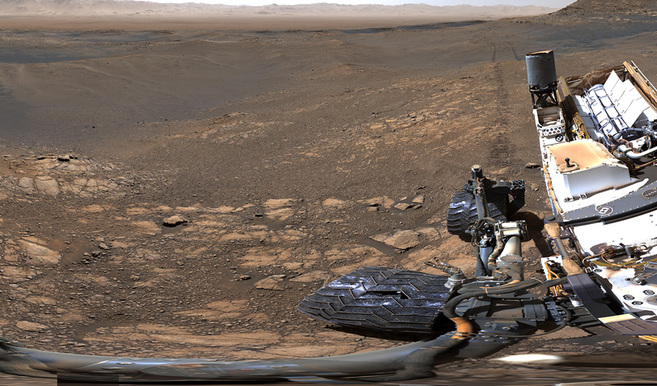- Weather station. 'Part of the time' on Mars is done with Spanish technology
- Geology, so Mars stopped resembling Earth
- Mission 'InSight'.The red planet suffered 174 earthquakes in 10 months
More than 1,000 images with 1.8 billion pixels make up the higher resolution panorama of the surface of Mars, thanks to the telephoto of the Curiosity rover's mast camera from NASA.
At the same time, the camera's mid-angle lens allowed to produce a second view of almost 650 million pixels that includes the rover's platform and the robotic arm.
Both panoramas show Glen Torridon, a region next to Mount Sharp that Curiosity is exploring. They were taken between November 24 and December 1, 2019 , when the mission team was on Thanksgiving holiday.
With few tasks to do while waiting for the team to return and provide its following commands, the rover had the opportunity to obtain images of his environment from the same point of view several days in a row.
Curiosity needed more than six and a half hours for four days to capture the individual shots. Mastcam operators programmed the complex task list, which included pointing the rover mast and making sure the images were focused. To ensure constant lighting, the images were limited between noon and 2 pm local time on Mars each day.
Team vacations
"While many in our team were at home enjoying turkey, Curiosity produced this feast for the eyes," said Ashwin Vasavada, a scientist at the Curiosity project at NASA's Jet Propulsion Laboratory, which leads the Curiosity mission. "This is the first time during the mission that we dedicate our operations to a 360-degree stereo panorama."
In 2013, Curiosity produced a 1.3 billion pixel panorama with both Mastcam cameras; Its black and white navigation cameras, or navigation cameras, provided images of the vehicle itself. Image specialists carefully assemble Mars scenarios by creating mosaics composed of individual images and combining their edges to create a perfect appearance.
According to the criteria of The Trust Project
Know more- Science and Health
- science
Food crisis Hunger grows again because of the weather
ScienceBernhard Schölkopf: "Europe cannot lose pace with artificial intelligence"
CienciaDuque ensures that the increase in budgets in R & D & I will be for direct aid and not credits

